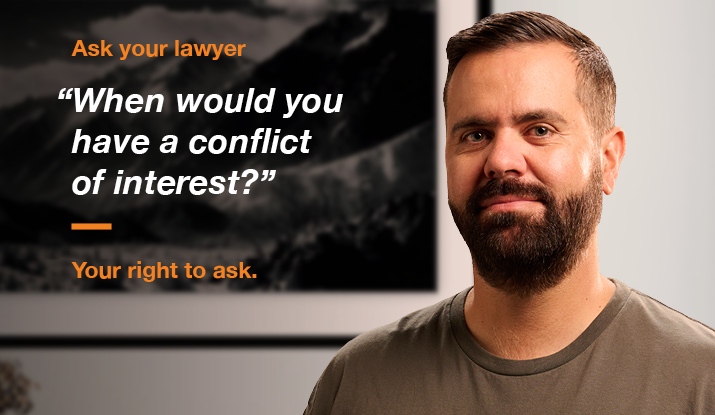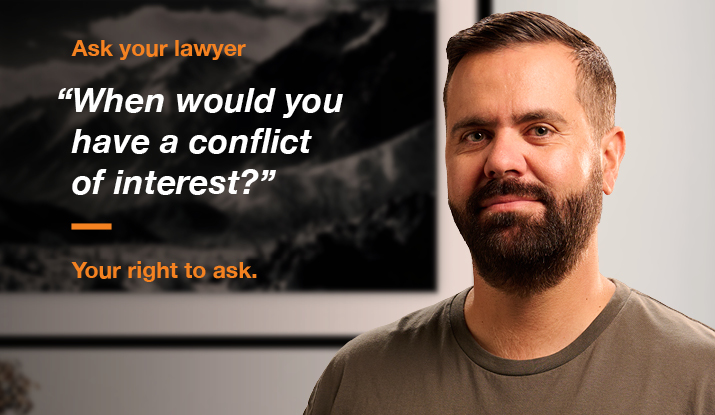

Your lawyer’s ethical obligations
Lawyers have strict ethical obligations to their clients, as well as to the court and the justice system.Lawyers have strict ethical obligations to their clients, as well as to the court and the justice system. These obligations are set out as part of the law and in lawyers’ professional rules of conduct.
Lawyers are obliged to:
- Act in your best interests when representing you, which involves giving you honest advice, and not putting their own or other people’s interests ahead of yours
- Generally (with certain exceptions) follow your lawful instructions
- Do their work competently, diligently, and as quickly as is reasonably possible
- Give you clear and timely advice to help you understand and make informed choices about relevant legal issues
- Tell you how much their legal services are likely to cost, and update you if the costs are likely to change
- Not disclose confidential information to any other person, other than the people working with them on your case, without your consent. Some exceptions apply – see ‘Keeping information confidential’ for further information
- In certain circumstances, refuse to work for you if a conflict of interest might arise
- Put their duty to the courts and the administration of justice ahead of their duty to you
A lawyer's most important duty is to the court and the administration of justice. This means that if acting in your best interests conflicts with their duty to the court, your lawyer must put the court before you. Lawyers must also be respectful to other people involved in the case, such as court staff, the person with whom you are in dispute, the other side’s lawyer, and any witnesses in the case.
Some examples of your lawyer’s obligations to the court and justice system include:
- Your lawyer can’t just say anything you want them to say in court
- Your lawyer can’t mislead the court, even if you ask them to
- If your lawyer finds out that you have lied to the court, your lawyer must get your consent to tell the court as soon as possible. If you don’t consent, your lawyer must refuse to act for you
- If you’ve told your lawyer that you’ve committed an offence your lawyer cannot suggest that someone else is responsible for that offence

Case study
Your lawyer’s duty to the court and the administration of justiceElijah hired a lawyer, Mei, to help him after being arrested for stealing a car. Elijah told Mei at their first appointment how he had stolen the car while on drugs. When Mei and Elijah discussed the options for how the case could be run, Elijah wanted to plead not guilty and to have Mei suggest in court that a witness who would be giving evidence for the prosecution was the actual guilty party.
Mei told Elijah that she could not do that, as he had already told her he had stolen the car. Mei recommended a different approach but could not change Elijah’s mind. Mei told Elijah that she could no longer be his lawyer, as she could not mislead the court.
Questions you can ask your lawyer about their duty to the court
- Is there particular information about me that you need to share with the court?
- In what circumstances would you not do what I asked you to?
- What will you do if the other party’s lawyers are being impolite/disrespectful or misleading the court?
Your lawyer has a legal duty to act in your best interests and must put your interests ahead of their own, or those of other people. Lawyers must balance their duty to act in your best interests with their duty to the court.
What this means is that they must give you advice that meets your objectives, financial situation and needs, and that they act in your best interests when providing that advice.
Your lawyer should ask questions to better understand your circumstances and find out what the best outcome is for you. When you meet with your lawyer, they should get to know you and what you want.
Things your lawyer may need to know to advise you
- How much you want, or have, to spend on the case
- Your circumstances – employment, access to support, health issues, etc.
- How much risk you are willing to accept; for example, whether you are prepared to go to court and risk paying more legal fees
- How quickly you need the matter resolved
- What outcome you want
- On what issues you might be willing to compromise
Talking about the outcome you want will help you and your lawyer agree on the best approach to running your case. Sometimes the outcome you are seeking isn’t possible. Your lawyer will tell you if this is so, and why.
Acting in your best interests also involves giving you honest advice, and not putting their own or other people’s interests ahead of yours. You can read more about this in the next sections.
Questions you can ask your lawyer about how they will manage your case and acting in your best interests
- What do you consider when you advise me on the best approach to my case?
- How will we communicate along the way?
- How will we check in to make sure we’re on track or discuss any changes in direction? Will we have regular discussions?
- How will you charge me for these catch ups?
- What happens if we disagree on how we should run my case?
- What happens if my circumstances change?
- What happens if I don’t get the outcome I’m looking for?
All communication between you and your lawyer is confidential and can only be revealed to others in very limited situations, even after you have finished working with your lawyer.
Telling your lawyer everything you can about your case will help them give accurate advice and avoid delays and changes to how your case is managed. This is an important protection that lets you speak honestly and openly with your lawyer, without worrying they will share this information beyond the following limited exceptions.
Your lawyer may disclose something without your consent, including:
- To avoid a serious criminal offence happening
- To prevent imminent serious physical harm to a person – for example, if you tell your lawyer you are going to hurt yourself or others
- Where compelled or permitted by law
- If they are getting confidential advice about their own legal or ethical obligations
- To defend against any complaints you may make against them
- To the insurer of their law practice

Case study
Keeping your information confidentialMandy hired a lawyer, Abdul, to help her with the financial settlement of her divorce. To help with the case, Abdul asked a forensic accountant to examine all the bank statements and documents that were given to the court by Mandy and her husband. Because Abdul needed to give these documents to the accountant, he checked with Mandy that this was okay before he sent them.
Generally, your lawyer must get your consent to share information you have provided to them. For example, if you need an expert opinion (for example, from a psychologist), you lawyer must ensure they have your consent before they share information with the relevant expert. This is often discussed when you engage the lawyer and forms part of the agreement (or retainer) you have with the lawyer.
Questions you can ask your lawyer about keeping information confidential
- How will you keep my information confidential?
- Are there any limits to keeping my information confidential?
- In what circumstances would you tell someone information about me or my case?
- Are there other lawyers in your office who will also work on my case?
- If we need a barrister, what information will they know?
- Will we need any expert reports or witnesses? If so, what will you tell them about me or my case?
Lawyers must put their client’s interests before their own and those of other people. This means that a lawyer usually can’t represent two different sides in the same case.
Lawyers also can’t use information they know from a former client that would help a new client’s case, where this might harm the interests of the former client. This is because lawyers must keep former client’s information confidential, just as they do for current clients.
Lawyers will generally do what is called a ‘conflict check’ to see if they or their practice are acting – or have previously acted – for someone else related to your case. If this happens, they may tell you that they can’t give you advice because they have a conflict.
Your lawyer also cannot receive any benefit from their relationship with you, other than the usual payment for the legal services they have provided. As an example, this means that your lawyer can not advise you to invest in their business or their friend or family member’s business.
There are some exceptions that allow a lawyer to act for you even when they are acting or have acted for someone else related to your matter.
Your lawyer can act for you if they have also acted for a former client, so long as:
- there is no confidential information about the former client that is relevant to your case
- their former client has agreed they can use the confidential information that might be relevant to your case
- you and all other people involved have agreed the lawyer can act for everyone. Your lawyer will need to put this in writing to all of you

Case study
Conflict of interestSian lives in regional Victoria, and is currently involved in family law proceedings. Her ex-partner, John, has hired a lawyer who lives in the same town, and knows them both socially. Sian is concerned that John’s lawyer has a conflict of interest because they have an existing personal relationship.
Sian speaks to her own lawyer, who confirms with her that John’s lawyer does not have any confidential information about her that is relevant to their family law proceedings. Sian is satisfied that a conflict of interest does not arise in this instance.
Questions you can ask your lawyer about conflict of interest
- Are you, or your practice working for someone else related to my case?
- Have you done a conflict of interest check?
- Have you, your practice, or any other lawyer working on my case ever worked for someone related to my case?
- If you are acting or have acted for someone else related to my case, how will you put my interests first?
- What steps do you have in place to stop other lawyers at your practice who have worked for someone related to my case seeing my information?
Legal professional privilege protects the communications between you and your lawyer. This means that when you talk, email, or write to your lawyer, the information is confidential. It also means the documents which are created from these conversations, such as notes and email trails, are also protected.
This doesn’t apply to everything you and your lawyer communicate about. For legal professional privilege to apply, the communications must be:
- Confidential. It must be information that you only want to share with your lawyer, and
- About providing you with legal advice. The communication needs to be about your legal issue and the lawyer providing you with legal advice. This also applies to communications where your lawyer is providing you with advice about any court or litigation proceedings.
These privileged communications are protected from disclosure in court proceedings, or to regulators with powers to ask for documents. The purpose of legal professional privilege is to ensure you can tell your lawyer everything they need to help you with your case.
The privilege is owned by the client, not the lawyer. That means the lawyer can’t share the information or communications, but the client can share this information if they choose to. Once the client shares the information, the privilege no longer applies.
There are some exceptions to legal professional privilege:
- Illegal purposes: Privilege does not apply when communications are made for the purpose of carrying out illegal activity.
- Statutory exclusions: Some laws have been written so that privilege doesn’t apply.
- Waiver: This is where the person who is claiming privilege (the client) acts in a way that is inconsistent with the privilege. For example, if a client discloses the legal advice (see the following case study).

Case study
Legal professional privilegeJuan tells his lawyer that he wants to enter a contract to buy a rival coffee shop to merge with his own. Juan’s lawyer, Maxine, draws up contracts and provides legal advice about the sale. Before the sale is finalised, Juan posts on Facebook that he is buying the rival business and advertises for clients. As Juan is the person who shared this information publicly, he has acted inconsistently with any claim of legal professional privilege that he might want to make in the future, and so he may no longer be able to claim it.
Questions to ask your lawyer about legal professional privilege
- What can I say to other people about the legal advice you give me?
- Is there information we discuss that I shouldn’t tell anyone else?
- Are my documents protected under legal professional privilege?
- Under what circumstances will our communications and documents no longer be confidential (where we lose privilege)?
- When and how will we communicate in relation to sensitive information?
- What happens if a privileged document is disclosed?
The legal profession in Victoria is divided into two distinct branches: solicitors and barristers.
Where the term ‘lawyer’ is used in this section, it refers to both barristers and solicitors.
If you need help with a legal matter, your first point of contact will generally be a solicitor. Barristers usually do most of their work in court. Either a solicitor or a barrister can represent you in court. Often a solicitor ‘briefs’ a barrister to appear on your behalf in court. However, a barrister may agree to represent you in court without being briefed by a solicitor for limited types of work (for example, advice and representation in minor criminal cases).
The solicitor will usually engage the barrister on your behalf and let you know the cost. This will generally be included in your bill from the solicitor, although sometimes you might need to pay the barrister directly.
For the most part, the same ethical rules apply to solicitors and barristers.
*this information was originally published in the Fitzroy Legal Service Law Handbook
For information about common legal problemsPeople often need a lawyer’s advice. They just don’t know where to start.
Lawfully Explained is an initiative of the Law Society of NSW, with support from the Law Institute of Victoria and the Queensland Law Society.
On Lawfully Explained, you will find a range of articles, podcasts, videos, and infographics explaining the most common legal issues, what to expect in a courtroom, and information on how to find the right solicitor for your individual circumstances.
https://lawfullyexplained.com.au
